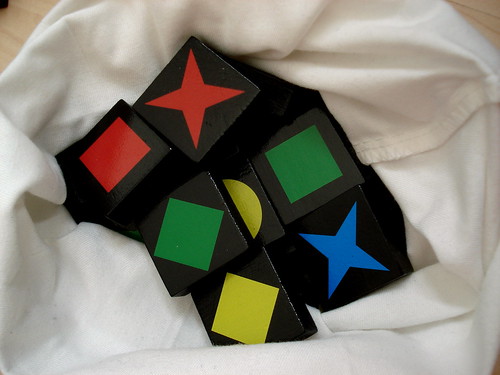| Strategy | Luck |
|---|---|
| Interaction | Components & Design |
| Complexity | Score |
The Spiel des Jahres jury is fond of games with incredibly simple rules this year. The recommendation list proves that much. It’s hardly surprising then that a game from that category is nominated for the award as well. And Qwirkle is indeed a well-chosen example of a simple-yet-deep game. I know I’ve overused the phrase recently, but the rules could hardly be simpler and faster to explain.
The only other thing to keep in mind beyond that is that you can exchange any number of your tiles against the same number from the bag – an option you will choose rarely for lack of scoring, but in some situations it’s the best or even the only thing you can do. When the bag is empty, the game still goes on until one player runs out of tiles. And now guess which player wins. If you didn’t guess “the one with the most points” you may need to play more games.

All this does sound a tad too simple even, almost like a game of dominoes. But consider this: Qwirkle was included in the Mensa Select list of 2007, not an award bestowed on easy games. And indeed there is much more depth to it than you might think after reading the rules. Finding the spot to place your tiles for the maximum amount of points is the least of your worries – not giving an opportunity to your opponents is a much bigger issue. In the beginning, you don’t have to worry about your opponents’ score as much, the probability that they have the right tiles to capitalise on your move is low. The more the game progresses though, the more you want to watch what you’re doing and which tiles are still in play – the scores at this point are usually close enough that giving away the chance to finish one line can be a significant setback. Your defensive strategy is to prevent your opponents from scoring big points. You offensive strategy, on the other hand, needs to be a healthy mix of planning ahead and opportunism. Planning ahead to keep the tiles you know may still score high in the end, opportunism to spot where a tile might suddenly score higher than expected .
In any number of players, Qwirkle is a tight mental battle where the winner is only decided in the end. The simple rules mean that a new player can be competitive even on their first game.And getting new people to play the game is an easy exercise as well: there is no time wasted explaining the rules, and the heavy wooden tiles invite people to just go and try Qwirkle. One small complaint about the components: Qwirkle is yet another game where, in bad light, colours become hard to tell apart. Especially red and orange are a problem – but you don’t have to play in bad light. And really, a game where that is the only complaint can be considered a good game by any standard. So maybe everyone that participated in our poll – the one where Qwirkle received no votes whatsoever – may be in for a surprise.
Some things, however, have to remain unanswered even in this extraordinary review: how do you pronounce Qwirkle? And what language is Qwirkle? The spelling does not imply any human language, but looking at the word I see two options. It might well be Klingon, they are fond of Qs and don’t follow them with a u, either. Qapla’ batlh je! Qwirkle maj! The other obvious option is whichever language Cthulhu cultists speak. Ph’nglui mglw’nafh Cthulhu R’lyeh wgah’nagl qwirkle. I don’t know which of these theories is true, so the origin and pronounciation of Qwirkle will have to remain a mystery.







